- collaboration
Invite Team Members
Assign Projects
Users & Role Management
Review Management [Test Cases]
Review Management [Elements]
Execution Controls
- test cases
Test Cases
Test Case List Actions
Import and Export Test Cases
Import Test Project Test Cases
Importing Postman Collections and Environments
Test cases for Desktop Windows
Update Test Case result in a Test Plan
Test cases for Mobile Web Application
- Test Step Types
Type: Natural Language
Type: REST API
Type: Step Group
Type: For Loop
Type: While Loop
Type: Block
Type: If Condition
Nested Step Groups
Create Test Steps
Image Injection
Cross-application testing
- Test Data Types
Raw
Parameter
Runtime
Random
Data Generator
Phone Number
Mail Box
Environment
Concat Test Data
Create Test Data [Parameter]
Update Test Data Profile
Updating Value in TDP
Import TDP
Bulk Deletion of a Test Data Profile
Create Test Data [Environment]
- Elements (Objects)
- Web Applications
Record Multiple Elements
Record Single Element
Create Elements
Supported Locator Types
Formulating Elements
Shadow DOM Elements
Verifying elements in Chrome DevTools
Handling iframe Elements?
Dynamic Locators using Parameter
Dynamic Locators using Runtime
Using Environment Test Data for Dynamic locators
Import/Export Elements
AI Enabled Auto-Healing
- test step recorder
Install Chrome Extension
Install Firefox Extension
Install Edge Extension
Exclude Attributes/Classes
- test plans
Add, Edit, Delete Test Machines
Add, Edit, Delete Test Suites
Schedule Test Plans
Run Test Suites In Parallel
Cross Browser Testing
Distributed Testing
Headless Testing
Test Lab Types
Disabling Test Cases in Test Plans
AfterTest Case
Post Plan Hook
AfterTest Suite
Email Configuration in Test Plan
Execute Partial Test Plans via API
Ad-hoc Run
Test Plan Executions
Dry Runs on Local Devices
Run Tests on Vendor Platforms
Run Test Plans on Local Devices
Test Locally Hosted Applications
Debug Test Case Failures
Parallel and Allowed queues
- debugging
Debug results on local devices (Web applications)
Debug Results on Local Devices
Launch Debugger in the Same Window
- Testsigma Agent
Pre-requisites
Setup: Windows, Mac, Linux
Setup: Android Local Devices
Setting up iOS Local Devices
Update Agent Manually
Update Drivers Manually
Delete Corrupted Agent
Triggering Tests on Local Devices
- troubleshooting
Agent - Startup and Registration Errors
Fetching Agent logs
Upgrade Testsigma Agent Automatically
Testsigma Agent - FAQs
- continuous integration
Test Plan Details
REST API (Generic)
Jenkins
Azure DevOps
AWS DevOps
AWS Lambda
Circle CI
Bamboo CI
Travis CI
CodeShip CI
Shell Script(Generic)
Bitrise CI
GitHub CICD
Bitbucket CICD
GitLab CI/CD
- desired capabilities
Most Common Desired Capabilities
Browser Console Debug Logs
Geolocation Emulation
Bypass Unsafe Download Prompt
Geolocation for Chrome & Firefox
Custom User Profile in Chrome
Emulate Mobile Devices (Chrome)
Add Chrome Extension
Network Throttling
Network Logs
Biometric Authentication
Enable App Resigning in iOS
Enable Capturing Screenshots (Android & iOS)
Configure Android WebViews
Incognito/Private mode
Set Google Play Store Credentials
- addons
What is an Addon?
Addons Community Marketplace
Install Community Addon
Prerequisites(Create/Update Addon)
Create an Addon
Update Addon
Addon Types
Create a Post Plan Hook add-on in Testsigma
Create OCR Text Extraction Addon
- configuration
API Keys
- Security(SSO)
Setting Up Google Single Sign-On(SSO) Login in Testsigma
Setting Up Okta Single Sign-On Integration with SAML Login in Testsigma
Setting up SAML-based SSO login for Testsigma in Azure
iOS Settings
Creating WDA File for iOS App Testing
- uploads
Upload Files
Upload Android and iOS Apps
How to generate mobile builds for Android/iOS applications?
- Testsigma REST APIs
Environments
Elements
Test Plans
Upload Files
Get Project wide information
Upload and update test data profile
Trigger Multiple Test Plans
Trigger Test Plan remotely and wait until Completion
Run the same Test Plan multiple times in Parallel
Schedule, Update and Delete a test plan using API
Update Test Case results using API
Create and update values of Test Data Profile using REST API
Rerun Test Cases from Run Results using API
- open source dev environment setup
macOS and IntelliJ Community Edition
macOS and IntelliJ Ultimate Edition
Windows and IntelliJ Ultimate Edition
Setup Dev Environment [Addons]
- NLPs
Unable to retrieve value stored in text element
Unable to capture dropdown element
Unable to Select Radiobutton
Unable to Click Checkbox
- setup
Server Docker Deployment Errors
Secured Business Application Support
Troubleshooting Restricted Access to Testsigma
Why mobile device not displayed in Testsigma Mobile Test Recorder?
Unable to create new test session due to unexpected error
- web apps
URL not accessible
Test Queued for a Long Time
Issues with UI Identifiers
Missing Elements in Recorder
Collecting HAR File
- mobile apps
Failed to Start Mobile Test Recorder
Troubleshooting “Failed to perform action Mobile Test Recorder” error
Test Execution State is Queued for a Long Time
Mobile app keeps stopping after successful launch
More pre-requisite settings
Unable to start WDA Process on iPhone
Most Common causes for Click/Tap NLP failure
Finding App Package & App Activity (Android)
- on premise setup
On-Premise Setup Prerequisites
On-Premise Setup with Docker-compose File
Post-Installation Checklist for On-Premise Setup
Install Docker on an Unix OS in Azure Infrastructure
SMTP Configuration in Testsigma
Configure Custom Domains
- salesforce testing
Intro: Testsigma for Salesforce Testing
Creating a Connected App
Creating a Salesforce Project
Creating Metadata Connections
Adding User Connections
Build Test Cases: Manual+Live
Salesforce Element Repositories
Intro: Testsigma Special NLPs
Integrate Testsigma with AWS DevOps
AWS services that are used as a part of CI/CD pipeline are:
- CodeCommit: AWS CodeCommit is a version control service that enables you to privately store and manage Git repositories in the AWS cloud.
- CodeBuild: CodeBuild compiles your source code, runs unit tests, and produces artifacts that are ready to deploy.
- CodeDeploy: AWS CodeDeploy is a deployment service that enables developers to automate the deployment of applications to instances and to update the applications as required.
This article discusses how to integrate Testsigma with AWS DevOps.
AWS DevOps integration methods:
Below are the 2 methods to integrate and trigger Testsigma tests via AWS DevOps:
- Go to CodeBuild Services, Create a Build Project, and Start a Build using your repository.
- Create CodePipeline with Source, Build, and Pipeline details. We’ll cover both methods.
Go to CodeBuild Services, Create a Build Project, and Start a Build using your repository:
- Click on the Build projects option under the Build section and Create a new Build Project:
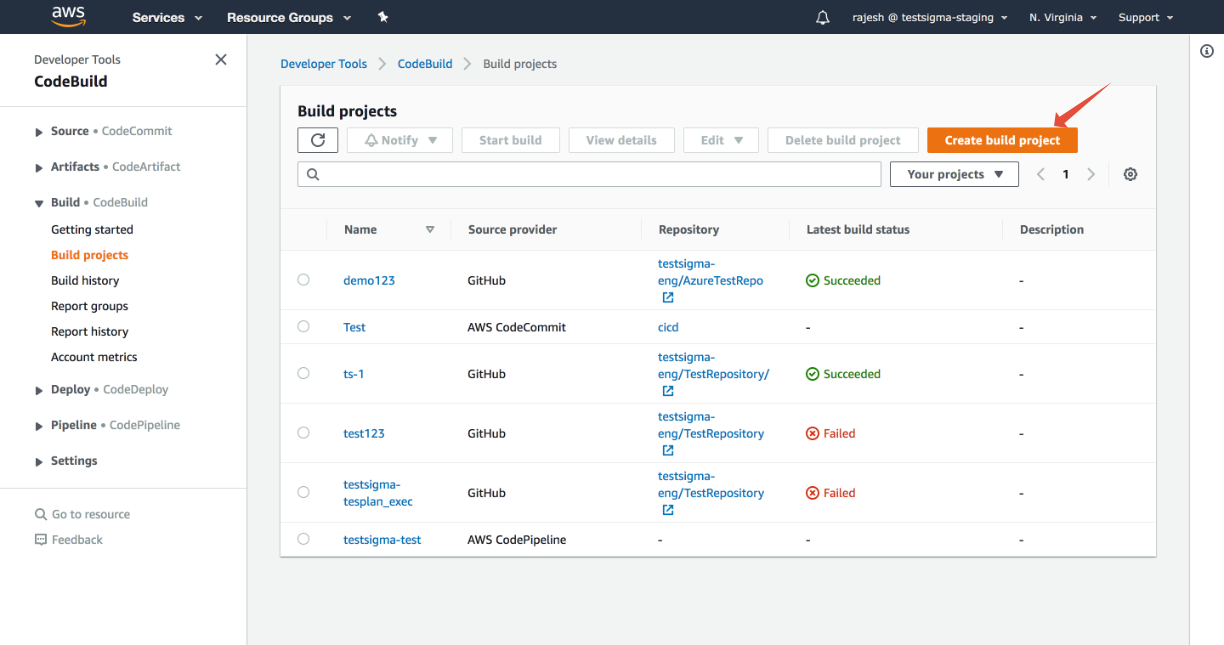
- Fill in the project configuration details and select the Source Provider and Repository accordingly. Here we have selected Github as our repository and give Buildspec name as your .yml file name
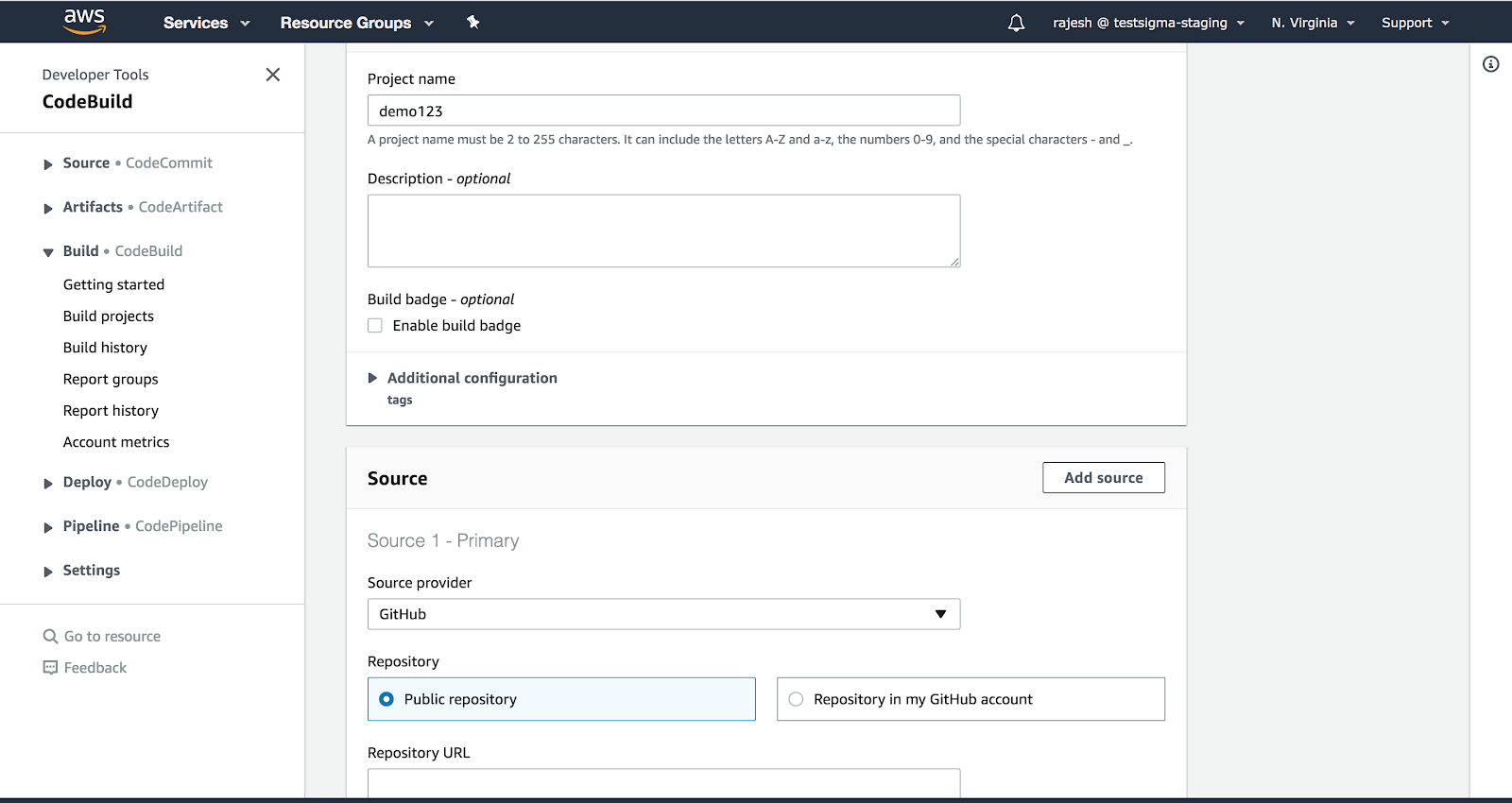
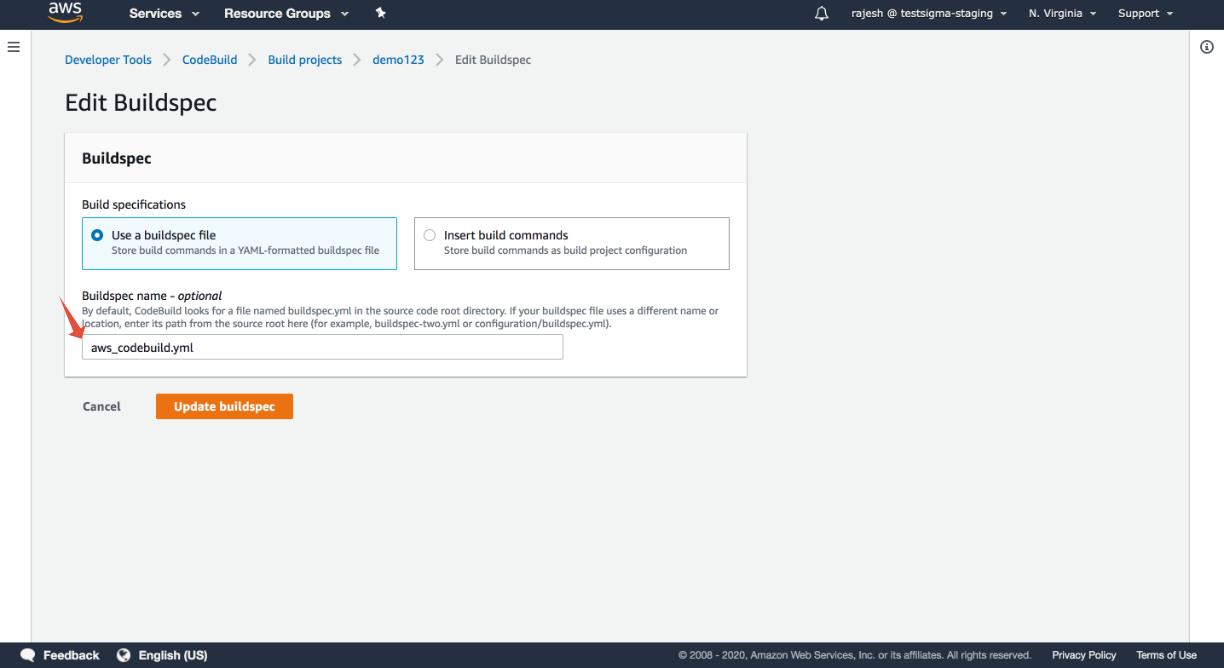
- Once this is done, please update the .yml file in the repository with the below code. In this case, we have taken a sample file aws_codebuild.yml:
Starter pipeline
Start with a minimal pipeline that you can customize to build and deploy your code
Add steps that build, run tests, deploy, and more:
version: 0.2
phases:
install:
runtime-versions:
java: corretto11
pre_build:
commands:
- echo Nothing to do in the pre_build phase...
build:
commands:
- bash cicd-api.sh
post_build:
commands:
- echo Build completed on `date`As shown in the above code, the file cicd-api.sh under commands needs to be updated with test plan details and added to the repository. We have taken a sample file.
Add the test plan details and API key to the .sh file which you need to trigger:
#********START USER_INPUTS ********
TESTSIGMA_API_KEY= <Give in an API Key Generated in the Configuration-> API Keys tab in Testsigma>
TESTSIGMA_TEST_PLAN_ID= <Test Plan ID for the run which you need to trigger>
MAX_WAIT_TIME_FOR_SCRIPT_TO_EXIT=180
REPORT_FILE_PATH=./junit-report.xml
RUNTIME_DATA_INPUT="buildurl=http://test.testsigma.com,data1=testdata"
#********END USER_INPUTS***********- Now in the AWS CodeBuild, click on start build:
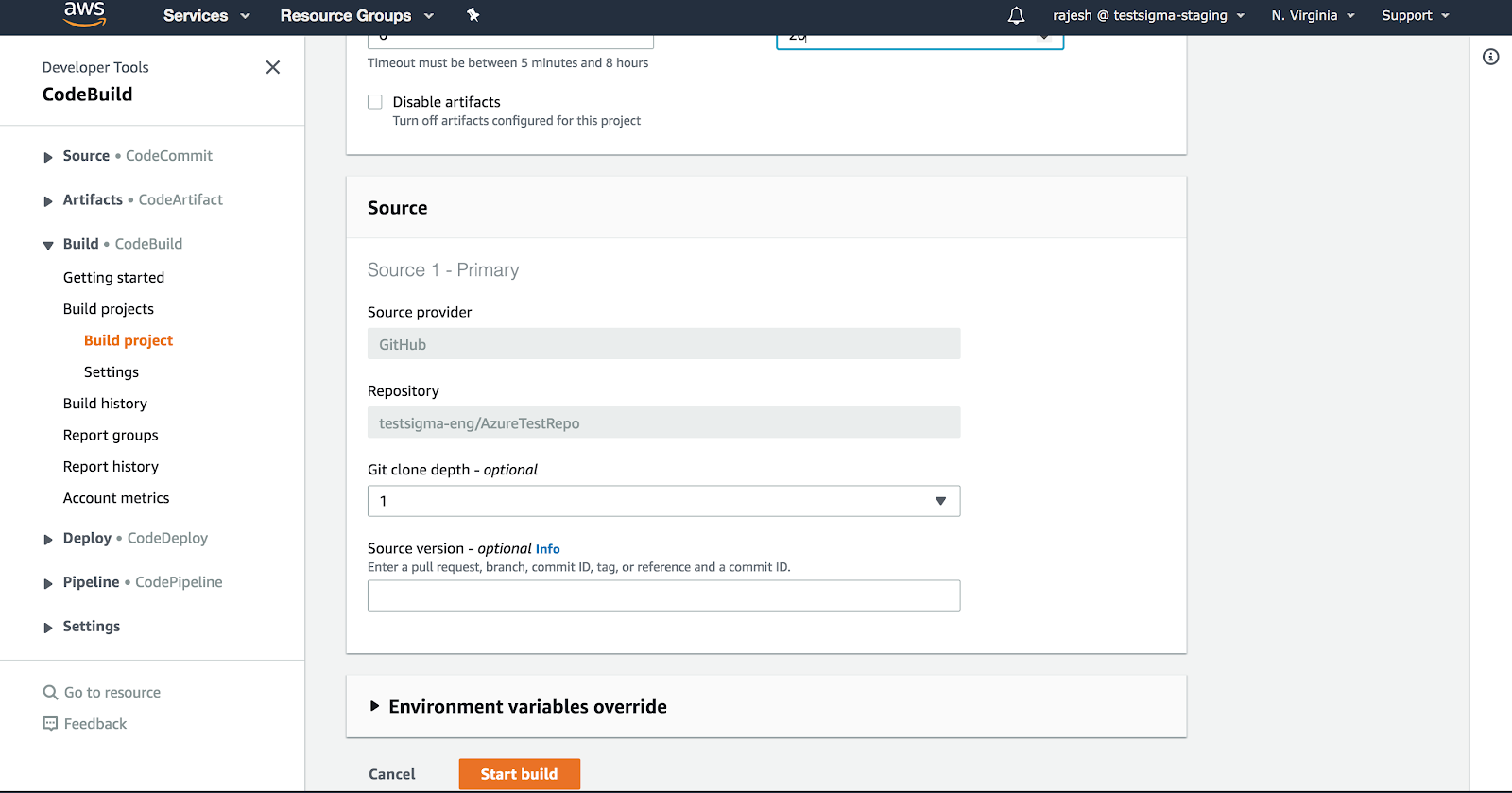
-
Once Build has been initiated you can check the progress and build logs as shown in the screenshot below:
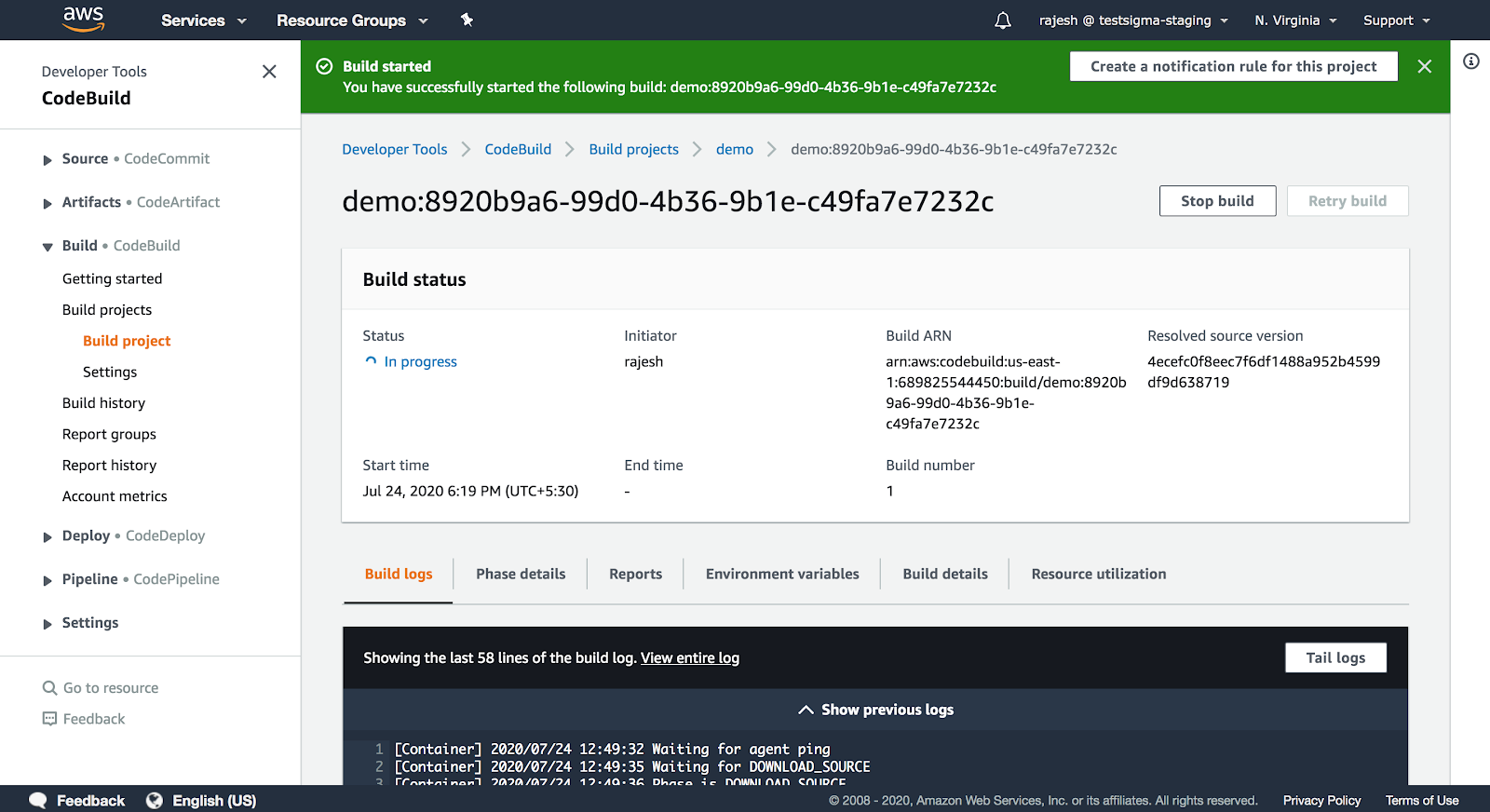
You will find the execution ID for the Test Plan within the REST API call to start Test Plan section.
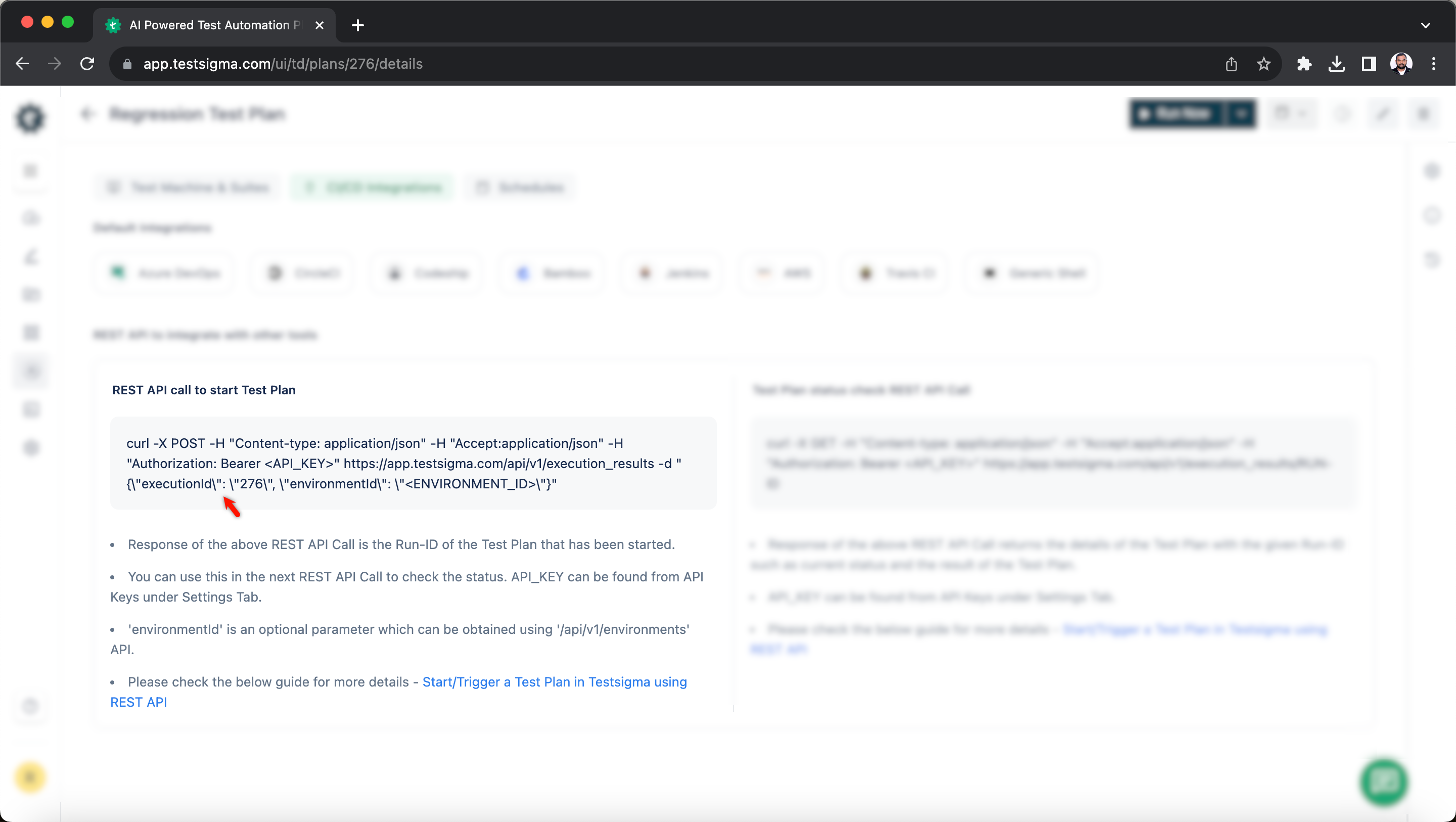
Create CodePipeline with Source, Build, and Pipeline details
Similarly, you can go to the CodePipeline service in AWS and create a pipeline for running the Source, Build and Deploy together. You can use the same project created in CodeBuild earlier inside your CodePipeline.
Follow the below steps for creating CodePipeline and triggering the test:
- Click on create a pipeline:
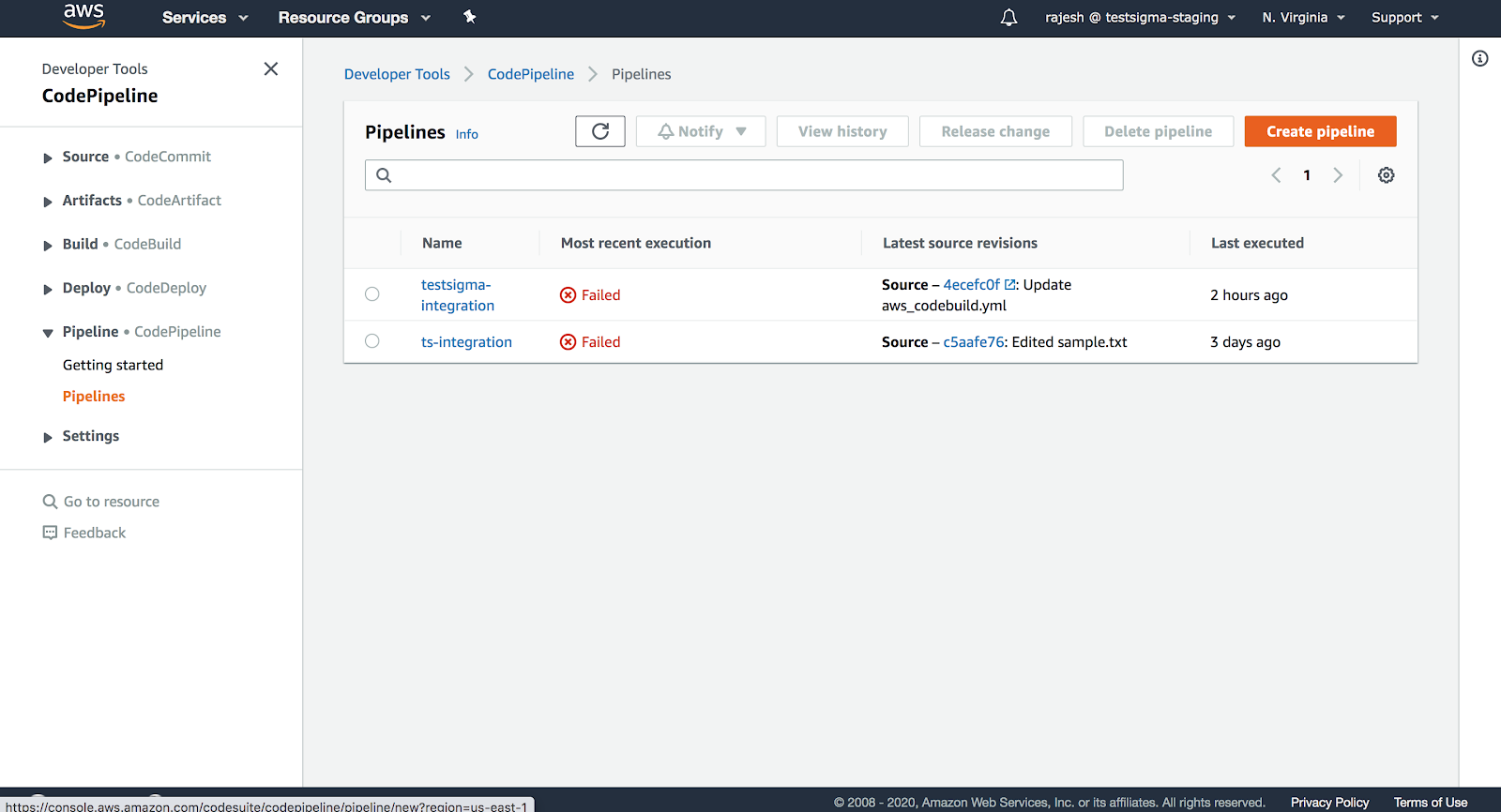
- Fill in the build details (selecting the repository accordingly) and select the project which you want to add to your pipeline. In the below screenshot you can see that the project which we created earlier in CodeBuild "demo123" is visible here and we will be selecting that only.
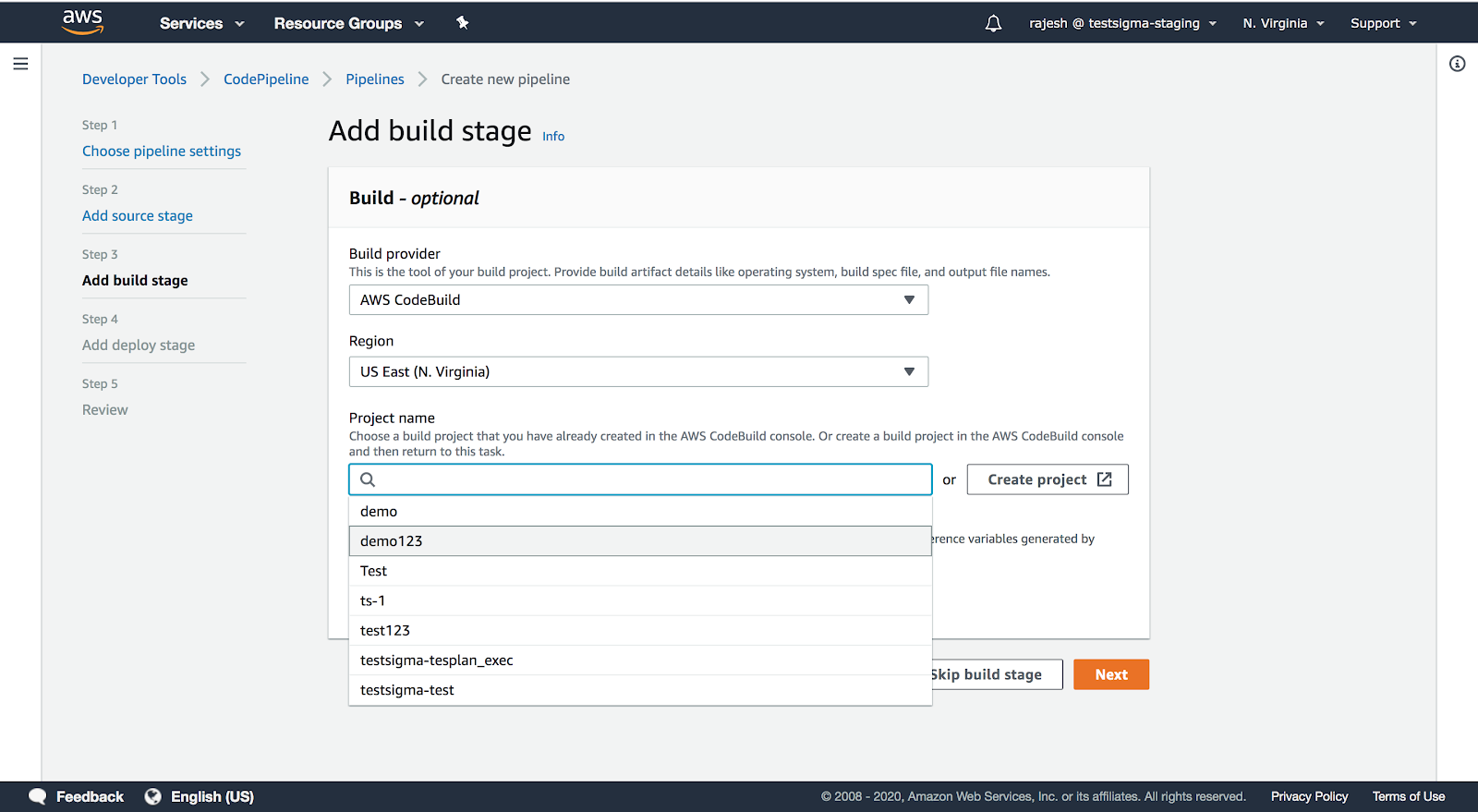
- Once you have given the details for the Pipeline settings, Source, Deploy stage then you can review the details and click on Create Pipeline:
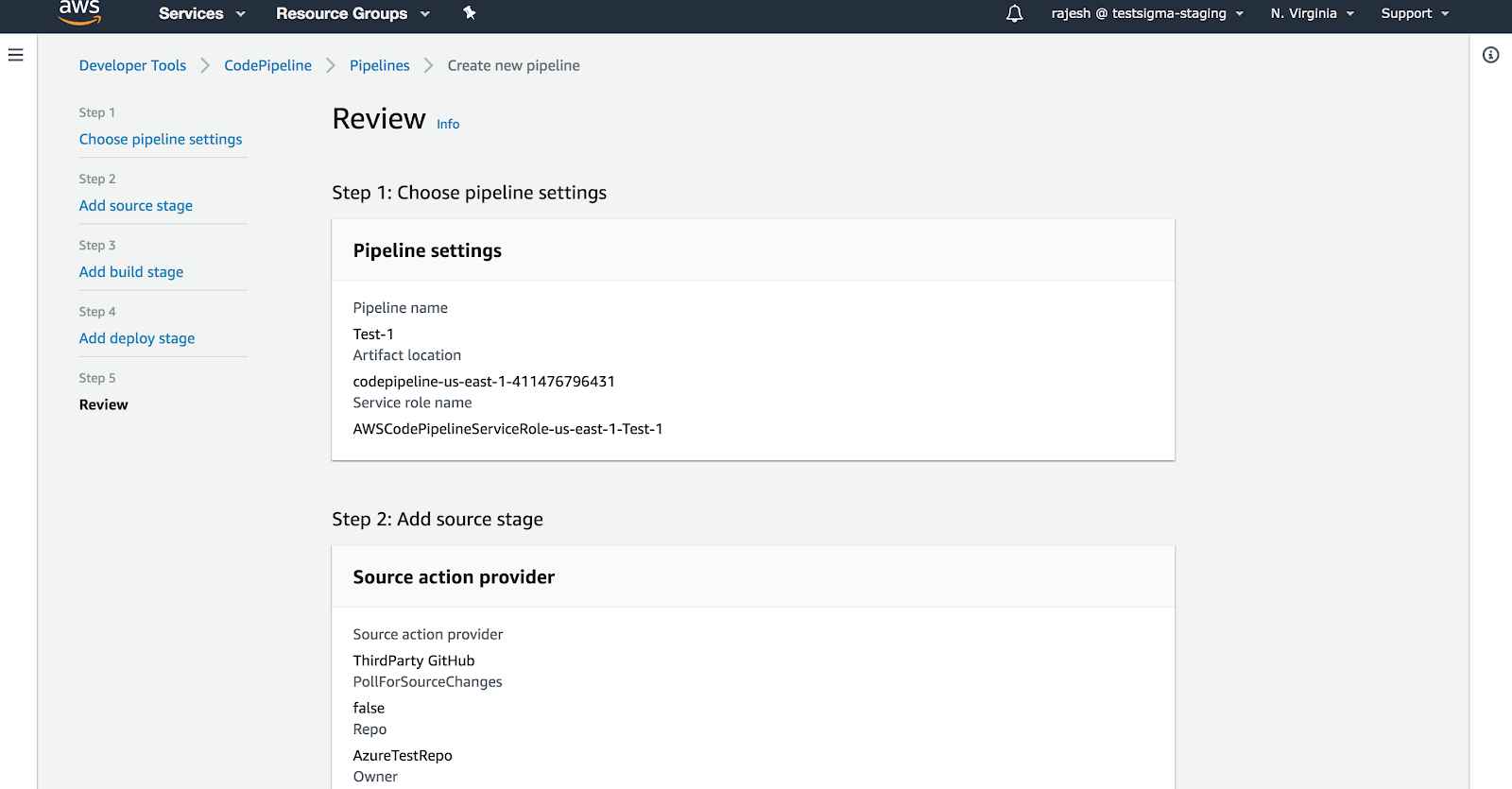
As soon as you click on create pipeline the run will be triggered:
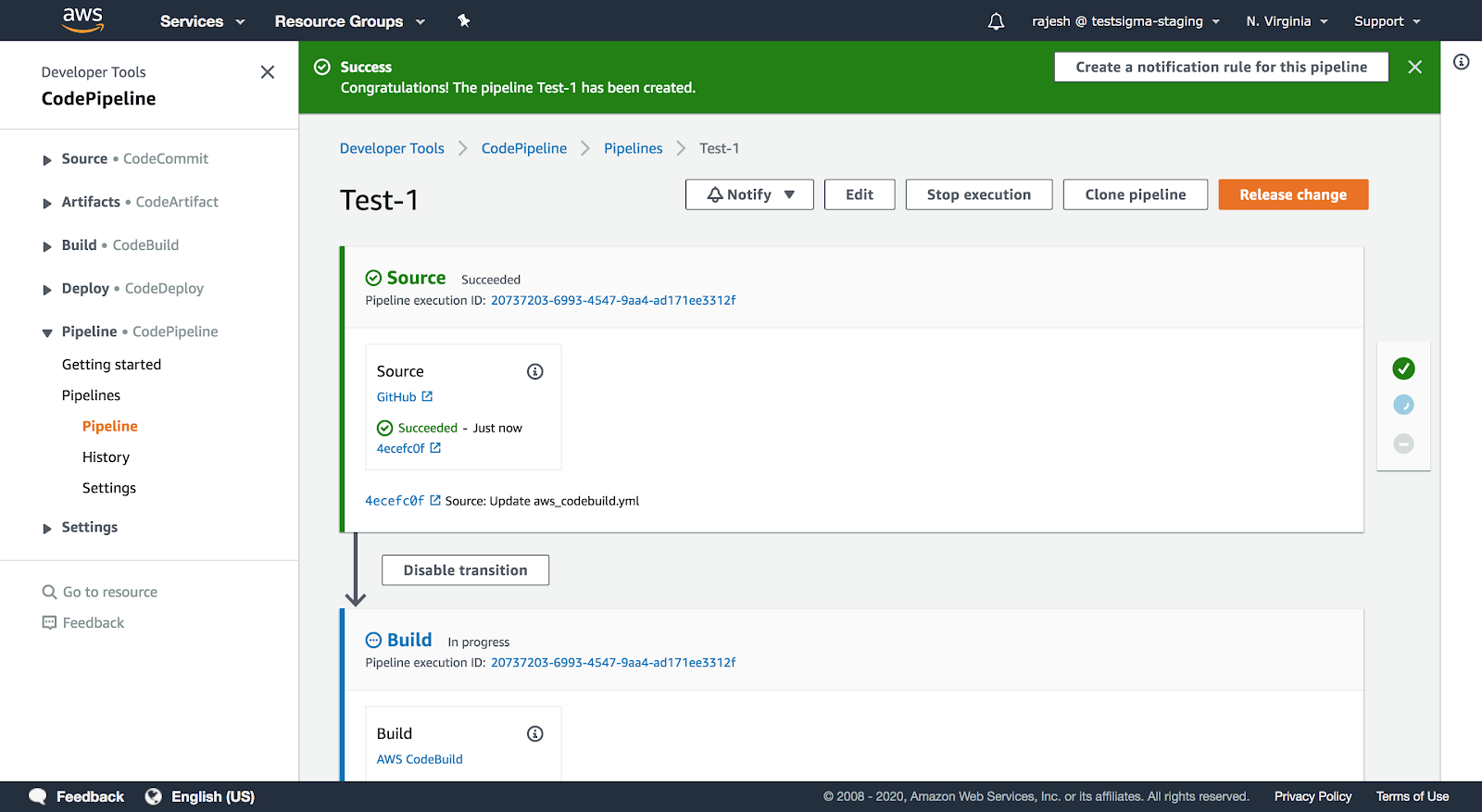
That's all we need to automate Test Execution when a successful build is triggered using the AWS DevOps.
Source: https://docs.aws.amazon.com/codepipeline/index.html